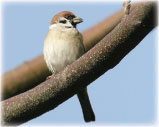
Many meanings surround the Chinese word for bird, such as 'ma que sui xiao, wu zang ju quan' (麻雀虽小,五脏俱全: Sparrow, although small, five organs all complete).
The Chinese also consider the magpie, which has negative associations in English, to be the 'happy bird'- 'xi que' (喜鹊), while the crow is the bad guy: 'tian xia wu ya yi ban hei' (天下乌鸦一般黑: The world crow same black - meaning, in every country dogs bite), and 'wu ya zui' (乌鸦嘴, crow mouth) which conveys the idea of a jinx upon he who says unlucky words.
Maybe because birds are traditionally kept as pets in China, the canary 'jin si que' (金丝雀: gold silk sparrow) means a mistress caged in a love nest, because it has everything but freedom. 'Xiao niao yi ren' (小鸟依人, little bird nestle to people) describes a lovely girl endearing herself to one. 
While early bird catches the worm, it's better for 'ben niao xian fei' (笨鸟先飞, stupid bird first fly - the slow need to start early). But don't pull too much ahead of the pack, as 'qiang da chu tou niao' (枪打出头鸟: gun shots out head bird - the outstanding usually bear the brunt of an attack).
(China Daily 12/26/2007 page15)